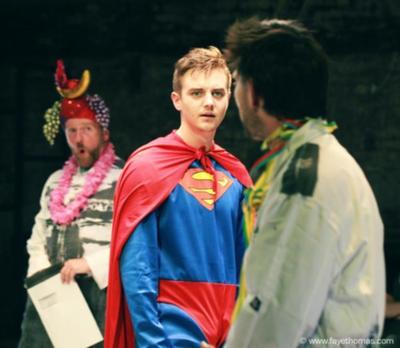Boiling Frogs, Southwark Playhouse
reviewed for The Spectator, 23 September 2010
 Boiling Frogs is an angry, important play. Set entirely in the mirrored cell of a police station, it hints at an Orwellian Britain in which civil liberties have been all but wiped away, by a State desperate to exert control over escalating terrorism, natural disasters and the rising heat.
Boiling Frogs is an angry, important play. Set entirely in the mirrored cell of a police station, it hints at an Orwellian Britain in which civil liberties have been all but wiped away, by a State desperate to exert control over escalating terrorism, natural disasters and the rising heat.
Unsurprisingly, this is a vision of our near future. With Parliament Square now closed to spontaneous protests and the 28 day limit on detention without charge recently renewed, playwright Steven Bloomer clearly believes Britain today could be only a few more wrong turns away from the nightmare on stage.
For a couple of years now, The Factory has been a cult company among young thespians. Founded to address the difficulties young actors find in maintaining their training, and the paucity of opportunities to tackle major texts, the company builds each of its productions out of semi-public workshops dedicated to exploring new techniques – and like all the best attempts to regenerate public dialogue, it allows interested members of the public to join the discussion online. At the heart of The Factory’s technique is a dedication to spontaneity, and it’s this high-risk energy that fizzles throughout Boiling Frogs. For The Factory, actor’s decisions should be made and remade again each night. Consequently, the company encompasses a strong element of suspicion towards acting techniques based on fixing a character – director Alex Hassell is heavily influenced by the work of Harold Guskin, who argues ‘the actor’s work is not to “create a character” but rather to be continually, personally responsive to the text’. Posting on the company’s website, Hassell paraphrases Guskin as, “whatever you bring to the part, the audience’s natural instinct is to make a ‘character’ from what they see and hear”, so the audience will impose consistency of character, provided the performance is fresh enough. The Factory’s first big hit, Hamlet, was wildly successful in divorcing character from text: each actor learned a range of parts and discovered which she would be performing only thanks to an audience member’s coin toss each night. Props would be volunteered by the audience each night, so for each scene, the surprised company would have a new artillery with which to improvise.
Whether or not such risks with character work for all texts, the Factory’s techniques succeeded in making even a play as well known as Hamlet consistently new and surprising. In a new work, like Boiling Frogs, it requires us to take a little more on trust. The actors feel slightly unsure throughout, which leaves the opening scenes slow and uncertain but soon leads to an electric sense of frustration and anxiety, perfectly capturing the charged atmosphere of a small cell. Similarly, the subtleties of the script take a little while to develop: the opening debate between policeman and protestor feels naïve and full of jargon. Statements like, “that depends on whether you think of liberty as a positive of negative construct”, will not add much nuance to the average audience member’s understanding of the British parliament’s Realpolitik.
But Boiling Frogs rewards patience. As the set itself shrinks, claustrophobia sets in, and ethics, politics and personality get much more complicated. By the end of the play’s 90 minutes, the audience emerges slightly shell shocked. The spontaneity of any Factory performance keeps everyone gripped, and artist Pochoir’s sets and costumes – constructed, Banksy-style, out of painted blocks of wood and fabric – heighten the sense of urban warfare.
The only thing that grates slightly is the extent of the play’s angry pessimism. While it is true that the last government saw an unprecedented extension of the powers of the State, productions like Boiling Frogs are part of a much larger public movement to undo this damage. The Coalition government may have failed to schedule enough time to abolish ID cards before the summer recess, but it has already scrapped the extended police powers to stop and search under section 44 of the Terrorism Act 2000, and ordered a major review of all of Labour’s “anti-terror” legislation, which is currently hearing evidence under the leadership of Lord Macdonald. Nonetheless, plays like Boiling Frogs will continue to be needed to make sure change does happen, and is not just talked about – Theresa May has promised to reduce the 28 day limit on holding suspects without trial, but she has not done so yet. Maybe she needs to go see Boiling Frogs.




